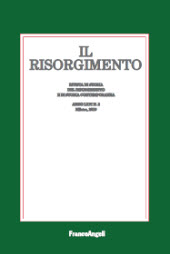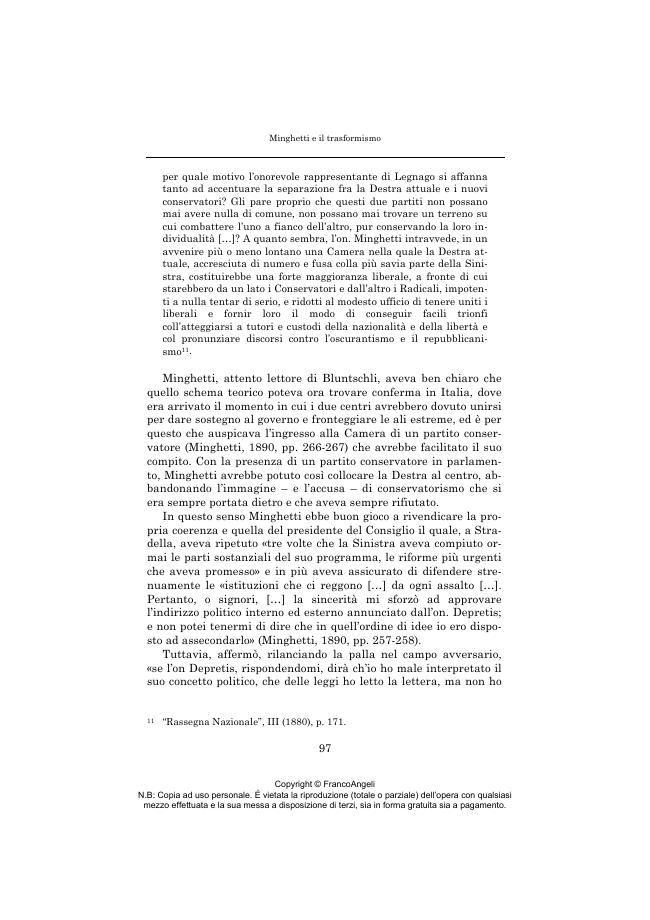2019 - Franco Angeli
Article
Digital Version
Télécharger | Copier/coller | Impression
Minghetti e il trasformismo
90-104 p.
- Marco Minghetti e Agostino Depretis sono stati gli esponenti della classe politica liberale che hanno introdotto in modo esplicito il trasformismo come sistema di governo del Paese, rivendicandone il merito e i vantaggi politici. Quello che i due leader liberali hanno portato a termine nel 1883 era in realtà il compimento di un processo che in modo effettivo e/o virtuale era già stato avviato sin dagli anni '50 nel Regno di Sardegna e poi nei primi anni dopo l'unificazione italiana. La novità introdotta dalla proposta di Depretis, subito accolta da Minghetti, va individuata nella consapevolezza del nuovo e sempre più decisivo ruolo dell'esecutivo che secondo Depretis andava sostenuto da una maggioranza stabile, formata dall'incontro, non dalla fusione, delle forze politiche favorevoli al progetto mentre per Minghetti con il trasformismo si sarebbe dovuto dar vita ad un'unica formazione politica, "un partito governativo di ordine liberale e conservatore ad un tempo". [Testo dell'editore].
- The contribution reconstructs the political imaginary and the organizational attempts promoted by the pontifical moderates in the years 1849-1851, to give their movement a more solid structure and able to adequately compete with the adversaries and to confront themselves with the new ways of doing politics emerged with the revolution of 1848. The original weakness of moderatism to think of itself as a formally structured party was due both to the prohibitive political-institutional context; to the congenital difficulty of thinking of oneself as one of the warring parties; and finally to the unresolved relationship that it had with the political sphere since its inception, all intent on weakening those dangerous processes of politicization initiated in 1848 which, in fact, had also revealed the "dark side" of politics. [Publisher's text].
- Marco Minghetti and Agostino Depretis, members of the liberal political class, have explicitly introduced the Trasformismo as a sys- tem of government, claiming its merit and political advantages. What the two liberal leaders carried out in 1883 was actually the fulfilment of a process that, in an effective and/or virtual way, had already been started in the Kingdom of Sardinia since the 1850s and then in the first years after the Italian Unification. The novelty introduced by the Depretis' proposal, immediately accepted by Minghetti, must be identified in the awareness of the new and increasingly decisive role of the Executive that, according to Depretis, was to be supported by a stable majority, formed by the meeting - not by the merger - of political forces favourable to the project, while for Minghetti, with the Trasformismo, it would have been necessary to create a single political formation, "a governmental party of liberal and conservative order at the same time". [Publisher's text].
Fait partie de
Risorgimento : rivista di storia del Risorgimento e di Storia Contemporanea : LXVI, 2, 2019-
Informations
Code DOI : 10.3280/RISO2019-002004
ISSN: 2465-0765
KEYWORDS
- Trasformismo, Marco Minghetti, Agostino Depretis
-
Dans le même fichier
- Marco Minghetti nel '48 : fra guerra nazionale, esperimenti costituzionali e ordine pubblico
- Marco Minghetti : una prospettiva europea per i notabili bolognesi nella prima metà del XIX secolo
- I moderati pontifici e la ricerca di un'organizzazione partitica (1849-1851)
- Minghetti e il trasformismo
- Quando è finito il laissez-faire? : Marco Minghetti, lo Stato e i suoi limiti
- Ombre del passato : la memoria della Rivoluzione francese nell'Assemblea costituente del 1848
- Recensioni
- Libri ricevuti e segnalazioni
- Abstracts



